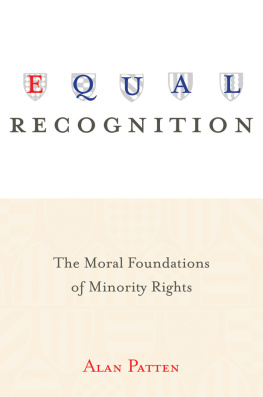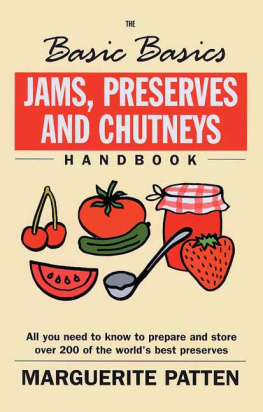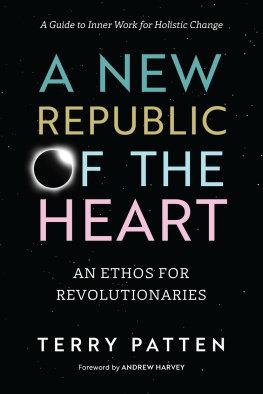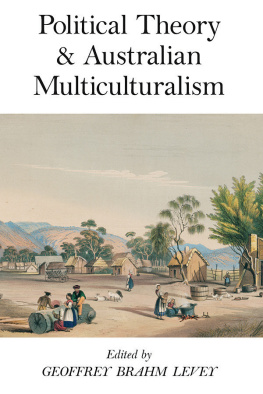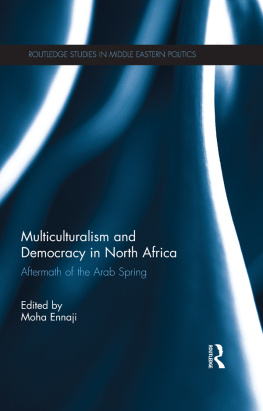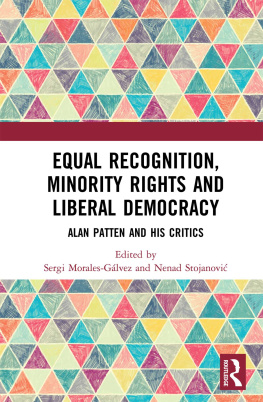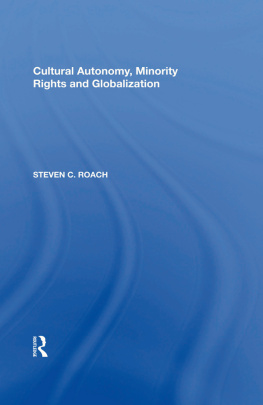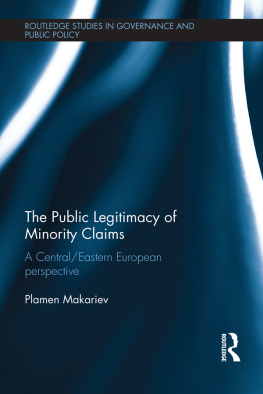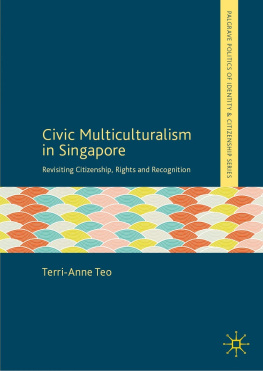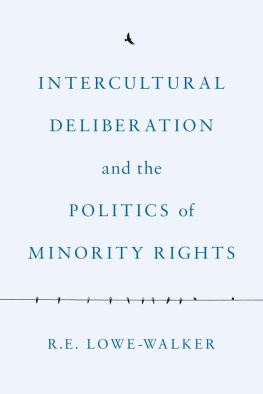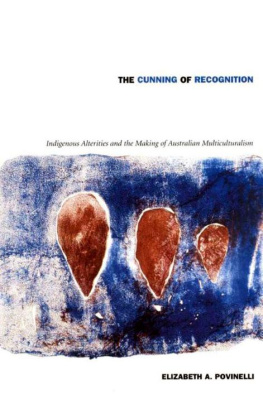
Equal Recognition
Equal Recognition
The Moral Foundations of Minority Rights
Alan Patten
PRINCETON UNIVERSITY PRESS
Princeton & Oxford
Copyright 2014 by Princeton University Press
Published by Princeton University Press, 41 William Street, Princeton, New Jersey 08540
In the United Kingdom: Princeton University Press, 6 Oxford Street, Woodstock, Oxfordshire OX20 1TW
press.princeton.edu
All Rights Reserved
ISBN 978-0-691-15937-9
British Library Cataloging-in-Publication Data is available
This book has been composed in Garamond Premier Pro
Printed on acid-free paper.
Printed in the United States of America
10 9 8 7 6 5 4 3 2 1
PREFACE
To many of my American friends and acquaintances, the subject matter of this book needs some explaining. The United States has always been a culturally diverse society, and new waves of immigration add to this diversity every day. To mention just one measure, a startling one out of five Americans reports using a language other than English at home. To most Americans, however, the countrys cultural diversity is not deeply consequential for its political morality. Cultural diversity is one more source of the differences that are pursued and expressed in the private realms of family, neighborhood, market, and civil society. The enjoyment of these differences is appropriately safeguarded by the liberties entrenched in the American constitutional tradition. But many believe that these generic protections of private life are all that is called for in the way of respect or accommodation of cultural diversity. Most Americans would have little sympathy for the idea that public institutions ought officially to protect or accommodate the cultural differences that exist in their country.
Attesting to this general skepticism about public claims based on culture is the relative absence of any major social movement devoted to preserving or promoting distinct cultures within the United States. In recent decades American society has been reshaped in dramatic ways by social movements defined around issues of race, class, gender, disability, and sexuality. There are also some signs today of a nascent movement to assert the rights of irregular migrants. But for the most part, these are all movements geared toward a goal of integration. They aim for the full inclusion of marginalized or subordinated groups into a unified American citizenship. What one does not observe is any large-scale campaign in favor of the rights of minority cultures to remain different. There are no large-scale organized efforts to extend equal status to Spanish alongside English in public institutions. Nor are there claims to self-determination or demands for self-government by national minorities. In general, one finds little feeling among Americans that the United States is imperfectly just by virtue of the ways in which it does or does not respect and accommodate its linguistic, cultural, and national minorities. Of course, southern secessionism played an enormous role in American political development, and echoes of these secessionist sentiments can still be heard now. But for most Americanseven in the Souththese sentiments are the proverbial exception that proves the rule.
To many readers, then, my topic will seem, if not exotic, then at least awfully Canadian. It is true, I should disclose from the start, that my interest in the questions addressed in this book was nurtured by an upbringing in Canada.
Many of my formative political memories as a child and a young adult were a product in one way or another of Canadas struggles with cultural diversity. Indeed, one of the very first memories of my childhood is walking hand in hand with my father up Redpath Place in Montreal to see the soldiers guarding the home of a prominent resident during the October Crisis of 1970. My father, a New Englander with liberal inclinations on most issues, maintained a lifelong admiration for Pierre Trudeaus decision to declare martial law in response to the kidnappings by the Front de Libration du Qubec. Just watch me, he was fond of saying, quoting a line from one of Trudeaus press interviews at the time. An even more vivid childhood memory is watching the returns from the 1976 Quebec provincial election in a glum room full of my mothers family. My mothers parents had fled Nazi Germany in the 1930s and raised their six children in the 1950s and 1960s as members of Quebecs Anglophone community. They could not help but see the election of the strongly nationalist Parti Qubcois as a disturbing return to the bitter European conflicts they had left behind.
Subsequent events would keep nationalism, language, and culture at the center of Canadian political life. These included the adoption of Bill 101 by the Quebec National Assembly in 1977 to promote and protect the French language; the referendum in Quebec in 1980 on sovereignty association; the patriation of the Canadian Constitution in 1982; the failures of the Meech Lake Accord of 1989 and the Charlottetown Accord of 1992, each of which sought to secure Quebecs assent to the 1982 Constitution; and the bare defeat, by a 50.6 to 49.4 percent margin, of a second referendum on the secession of Quebec in 1995. Meanwhile, Canadians bitterly debated free trade with the United States, with opponents arguing inter alia that the Free Trade Agreement of 1987 and the North American Free Trade Agreement (NAFTA) of 1994 would hasten the demise of a distinct Canadian culture.
My earliest interest in the topics addressed in this book was certainly stimulated by an upbringing amid these Canadian events and debates. They raised fascinating questions about justice and the nature of liberal democracy. Trudeaus vision of liberalism approved of federalism, official bilingualism, and Canadian nationalism but disapproved of secessionism, demands for special status, and Quebecs public privileging of French over English. Was Trudeaus the correct interpretation of liberal principles, or could they, perhaps should they, be understood in some different way?
But while my interest in questions of nationalism and culture has its origins north of the border, the questions have much broader relevance. In important ways, the rest of the world looks much more like Canada than it does the United States. Many of the worlds leading democracies are home to established linguistic and national minorities, which organize themselves to assert their own rights and status. To be sure, each of these countries has its own history, its own political traditions, and its own peculiar sociodemographic profile. There is no Canadian model readily available for export around the world because Canadas approach, even were it generally regarded as a success, is adapted to its own specific circumstances. Nevertheless, there is a set of problems and puzzles concerning the nature and value of culture that is familiar from the Canadian experience and that arises in some shape or form in every region of the world.
Moreover, if one thinks long enough about these problems and puzzles, one starts to see their relevance even for the United States. In part, this is for the obvious, Wilsonian reason that the United States is an international actor with global power. It is expected to take a position on demands for cultural recognition and self-determination that are regularly made on the world stage. How should the United States have responded to the cultural claims of national groups as Yugoslavia and the Soviet Union were breaking up? Insofar as the United States used its influence to secure language rights or self-government rights for national minorities, was there a consideration of principle at stake? Is the threatened destruction of Tibetan culture itself a reason for the United States to oppose Chinas occupation of Tibet? How should the United States respond to secessionist movements in Scotland and Catalonia (not to mention Quebec)?
Next page
